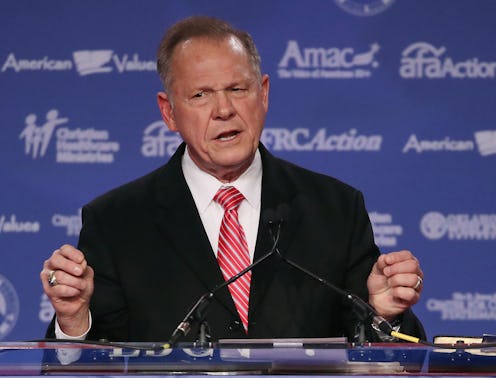News
37 Percent Of Evangelicals Are More Inclined To Support Roy Moore Post-Allegations

According to a recent poll conducted by the JMC data firm, almost 40 percent of Alabama evangelicals say they're more likely to support Roy Moore after allegations of sexual misconduct have surfaced against him. Though it's no secret that certain congressional Republicans continue to support Moore, the poll's numbers suggest the allegations could have worked in his favor among particular groups.
The Alabama Republican Senate candidate and former state judge was accused of sexual misconduct in a report published by The Washington Post. The report alleged that Moore had pursued a sexual relationship with a 14-year-old, though he strongly denies the allegations. "These allegations are completely false and are a desperate political attack by the National Democrat Party and the Washington Post on this campaign," the GOP candidate said.
In addition to the woman who accused Moore of sexual misconduct when she was 14 and he was reportedly a 32-year-old assistant district attorney, three other women accused the Republican of reportedly "pursuing" them when they were teenagers. Although the three women say Moore did not coerce them into any sexual act, they said they found his reported "flattering" problematic. As mentioned before, Moore has denied these allegations and said, in regards to The Post report, "this garbage is the very definition of fake news."
While Moore may not be enjoying a fun ride in news media, polling from JMC showed that, at least among evangelicals, the politician's public image seems to be unscathed. The Louisiana-based data firm polled 575 responses in its 11 question-based survey on Nov. 9 and Nov. 11. and claimed that its survey exhibited a confidence interval of 95 percent with a 4.1 percent margin of error. Although the poll fielded responses from a 75 percent white and 23 percent black respondent base, it does not specify the racial makeup of the 37 percent evangelicals who noted they were "more likely" to vote for Moore post-allegations.
The questions in the JMC poll ranged from simple questions regarding voter participation likelihood such as "Do you plan to vote in the U.S. Senate special election on Dec. 12?" to the rate of voter support for different candidates, including Democrat Doug Jones and Independent Arlester McBride.
The eighth question of the poll touches upon the recent accusations against Moore, which he strongly denies, and asks, "Given the allegations that have come out about Roy Moore's alleged sexual misconduct against four underage women, are you more or less likely to support him as a result of these allegations?" In the evangelical category of responders, 37 percent said they were "more likely" to support the candidate after the allegations while only 28 percent said that they were "less likely." A sizable portion of the responders, at 34 percent among evangelicals, said that the accusations made no difference to them.
The majority of the responders, however, had a slightly different say on the controversial matter. All in all, 29 percent said they were "more likely" to support Moore post-allegations while 38 percent went in the opposite direction and claimed they were "less likely" to vote for Moore now that the allegations have surfaced. Another 33 percent said they were indifferent to the recent accusations.
It's hard to predict the outcome for Moore's campaign based on the poll but it's already evident that, at this moment, his Democratic rival Jones is enjoying a four-point lead over him. As opposed to the 42 percent pro-Moore responders in the JMC poll, 46 percent say they would support Jones. That seems to be a significant dent in the public's perception of the senior GOP runner. But still, the fact that the allegations have more strongly motivated some voters to support Moore is unexpected.